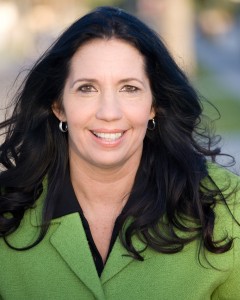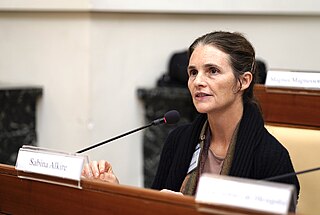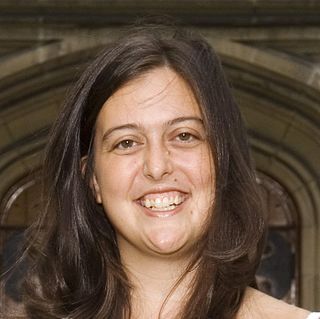Related Research Articles

Welfare is a type of government support intended to ensure that members of a society can meet basic human needs such as food and shelter. Social security may either be synonymous with welfare, or refer specifically to social insurance programs, which provide support only to those who have previously contributed, as opposed to social assistance programs, which provide support on the basis of need alone. The International Labour Organization defines social security as covering support for those in old age, support for the maintenance of children, medical treatment, parental and sick leave, unemployment and disability benefits, and support for sufferers of occupational injury.

Homelessness in the United States refers to the issue of homelessness, a condition wherein people lack "a fixed, regular, and adequate nighttime residence" as defined by The McKinney–Vento Homeless Assistance Act. Point-in-time single night counts prepared by shelter providers differ greatly from federal government accounts. In 2014, approximately 1.5 million sheltered homeless people were counted. The federal government statistics are prepared by the United States Department of Housing and Urban Development's Annual Homeless Assessment Report; as of 2018, HUD reported there were roughly 553,000 homeless people in the United States on a given night, or 0.17% of the population. Annual federal HUD reports contradict private state and local reports where homelessness is shown to have increased each year since 201 across several major American cities, with 40 percent increases noted in 2017 and in 2019. In January of 2018 the federal government statistics gave comprehensive encompassing nationwide statistics, with a total number of 552,830 individuals, of which 358,363 (65%) were sheltered in provided housing, while some 194,467 (35%) were unsheltered.

Social exclusion or social marginalisation is the social disadvantage and relegation to the fringe of society. It is a term used widely in Europe and was first used in France. It is used across disciplines including education, sociology, psychology, politics and economics.
The Poor People's Economic Human Rights Campaign (PPEHRC) is a coalition of grassroots organizations, community groups, and non-profit organizations in the United States of America committed to uniting the poor across color lines as the basis for a broad movement to abolish poverty. The PPEHRC seeks to advance economic human rights as outlined in Articles 23, 25, and 26 of the Universal Declaration of Human Rights. These include the rights to education, food, health, housing, communication, and a living wage job.

Philip G. Alston is an Australian international law scholar and human rights practitioner. He is John Norton Pomeroy Professor of Law at New York University School of Law, and co-Chair of the law school's Center for Human Rights and Global Justice. In human rights law, Alston has held a range of senior UN appointments for over two decades, including United Nations Special Rapporteur on extrajudicial, summary or arbitrary executions, a position he held from August 2004 to July 2010. In 2014 he was appointed to an unpaid role as UN Special Rapporteur on extreme poverty and human rights.
Poverty in Canada refers to people that do not have "enough income to purchase a specific basket of goods and services in their community."
Welfare rights means the rights of people to be aware of and receive their maximum entitlement to state welfare benefits, and to be treated reasonably well by the welfare system. It has been established in the United Kingdom since 1969 and has also been developed in other countries including Ireland, Australia and the United States. It became necessary because of the complexity of the UK social security system and had links at the time with a growing Claimants Union movement. As local authorities realized the advantages of having well-informed front-line staff such as housing officers and social workers, who often have to deal with benefit queries as part of their wider tasks, they turned to welfare rights staff to provide that expertise for both training and handling complex cases. In the 1980s, as local authorities took on the wider 'equalities' agenda, anti-poverty work was seen as a valid local activity in itself. Increasing benefit income helps individuals but also boosts the local economy.

Subsidized housing in the United States is administered by federal, state and local agencies to provide subsidized rental assistance for low-income households. Public housing is priced much below the market rate, allowing people to live in more convenient locations rather than move away from the city in search of lower rents. In most federally-funded rental assistance programs, the tenants' monthly rent is set at 30% of their household income. Now increasingly provided in a variety of settings and formats, originally public housing in the U.S. consisted primarily of one or more concentrated blocks of low-rise and/or high-rise apartment buildings. These complexes are operated by state and local housing authorities which are authorized and funded by the United States Department of Housing and Urban Development (HUD). More than 1.2 million households currently live in public housing of some type.

Homelessness is defined as living in housing that is below the minimum standard or lacks secure tenure. People can be categorized as homeless if they are: living on the streets ; moving between temporary shelters, including houses of friends, family and emergency accommodation ; living in private boarding houses without a private bathroom or security of tenure. The legal definition of homeless varies from country to country, or among different jurisdictions in the same country or region. United States government homeless enumeration studies also include people who sleep in a public or private place not designed for use as a regular sleeping accommodation for human beings. People who are homeless are most often unable to acquire and maintain regular, safe, secure and adequate housing due to income that is inconsistent or lacking altogether. Homelessness and poverty are interrelated. There is no methodological consent on counting the homeless and identifying their special needs; thus in most cities only estimated homeless populations are known.
Mimi Abramovitz is an American author, educator and activist. Abramovitz's work focuses on civil and welfare rights of those living in the United States, especially women.
Canada Without Poverty (CWP) is a not-for-profit organization dedicated to eradicating poverty in Canada and educating Canadians about the link between poverty and human rights. It is based in Ottawa, with a second office in Vancouver and is run by a board of directors who have, or have had, personal experiences of poverty. Canada has yet to develop consistent poverty indicators, which makes it difficult to effectively help the estimated 1 in 7 or 4.8 million people living in conditions of poverty. This is what CWP is working to change.

Cheri Lynn Honkala is an American anti-poverty advocate, co-founder of the Kensington Welfare Rights Union (KWRU) and co-founder and National Coordinator of the Poor People's Economic Human Rights Campaign. She has been a noted advocate for human rights in the United States and internationally. She is the mother of actor Mark Webber.
The National Union of the Homeless (NUH) was a national union of local activist organizations that fought for housing rights and economic justice in the United States. The organization was active between 1985 and 1993. At its height the National Union of the Homeless had over 20 local unions and 15,000 members.
Lane Kenworthy is an American professor of sociology and political science. He has worked at the University of Arizona since 2004, being a full professor since 2007. He is known for his statistical and analytic work on the economic effects of income and wealth distribution. He currently teaches at the University of California, San Diego.

Sabina Alkire is the director of the Oxford Poverty and Human Development Initiative (OPHI), an economic research centre within the Oxford Department of International Development at the University of Oxford, England, which was established in 2007. She is a fellow of the Human Development and Capability Association. She has worked with organizations such as the Commission on the Measurement of Economic Performance and Social Progress, the United Nations Human Development Programme Human Development Report Office, the European Commission, and the UK's Department for International Development.
Sanjiv M. Ravi Kanbur, is T.H. Lee Professor of World Affairs, International Professor of Applied Economics, and Professor of Economics at Cornell University. He worked for the World Bank for almost two decades and was the director of the World Development Report.

Gloria Casarez was an American civil rights leader and LGBT activist in Philadelphia. Casarez served as Philadelphia's first director of Lesbian, gay, bisexual and transgender (LGBT) affairs. During her tenure as director, Philadelphia ranked as the number one city nationwide for LGBT equality. Casarez served as the executive director of Gay and Lesbian Latino AIDS Education Initiative (GALAEI) from 1999–2008.
Shatakshee Ramesh Dhongde is an associate professor at the School of Economics, Ivan Allen College of Liberal Arts, Georgia Institute of Technology. She has provided research papers to the several institutions including the International Monetary Fund and the World Institute for Development Economics Research (WIDER). Her work has also appeared in several academic journals including World Development.

Homelessness in South Africa dates back to the apartheid period. Increasing unemployment, lack of affordable housing, social disintegration, and social and economic policies have all been identified as contributing factors to the issue. Some scholars argue that solutions to homelessness in South Africa lie more within the private sphere than in the legal and political spheres.

Liz Theoharis is an American theologian who is the co-chair of the Poor People's Campaign: A National Call for a Moral Revival, and the Director of the Kairos Center for Religions, Rights, and Social Justice at Union Theological Seminary. She is an ordained minister in the Presbyterian Church.
References
- 1 2 Bricker-Jenkins, Mary; Young, Carrie; Honkala, Cheri (2007). "Using economic human rights in the movement to end poverty: the Kensington Welfare Rights union and the Poor People's Economic Human Rights campaign". In Reichert, Elisabeth (ed.). Challenges in human rights: a social work perspective. New York: Columbia University Press. pp. 122–137. ISBN 9780231137201. OCLC 76864302.
- ↑ Salvatierra, Alexia; Heltzel, Peter Goodwin (2014). Faith-rooted organizing: mobilizing the church in service to the world. Downers Grove, Illinois: InterVarsity Press. p. 59. ISBN 9780830836611. OCLC 861966476.
- ↑ Bowers, John Waite; Ochs, Donovan J.; Jensen, Richard J.; Schulz, David P. (2010). The rhetoric of agitation and control (3rd ed.). Long Grove, IL: Waveland Press. p. 154. ISBN 9781577666141. OCLC 406133470.
- ↑ Lippmann, Laura (13 April 1997). "Welfare mythology: buried charlatan [review of Myth of the Welfare Queen by David Zucchino]". The Baltimore Sun . Retrieved 10 December 2017.
- ↑ Jha, Sandya Rani (2017). "The power of keeping it simple: humans deserve housing". Transforming communities: how people like you are healing their neighborhoods. Saint Louis, Missouri: Chalice Press. pp. 48–60. ISBN 9780827237155. OCLC 988276950.
- ↑ Maryniak, Paul (24 September 1994). "Homeless families evicted: squatters booted from HUD houses". Philadelphia Daily News . Archived from the original on 22 December 2015. Retrieved 10 December 2017.